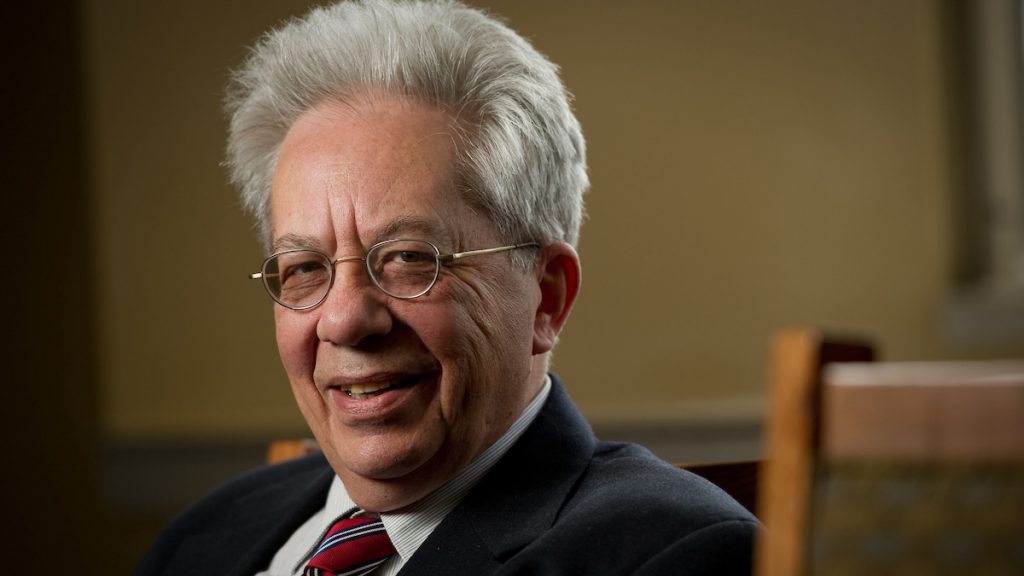In Memory of Joseph Buttigieg, Translator of the Complete Prison Notebooks of Antonio Gramsci

Photo by Matt Cashore/University of Notre Dame
“But to my mind his life’s work was as a Gramsci scholar; he was selflessly devoted to bringing into English the wide-ranging, influential, and absorbing writings of an extraordinary intellectual of the last century.”
~Jennifer Crewe, Director of Columbia University Press
Joseph Buttigieg passed away on January 27, 2019 at the age of 71. He was the William R. Kenan Jr. Professor Emeritus of English and retired director of the Hesburgh-Yusko Scholars Program at the University of Notre Dame and the translator for of the complete Prison Notebooks of Antonio Gramsci, published by Columbia University Press. Today we honor him with this special post written by Press Director Jennifer Crewe.
• • • • • •
When I arrived at Columbia University Press in 1986 I was told by our former director, John D. Moore, that a contract had been signed between the Press and the Istituto Gramsci three years earlier for publication of a translation of the complete Prison Notebooks of Antonio Gramsci, and that I was to be in charge of shepherding the multi-volume work through to publication. The project had been highly recommended to us by Edward W. Said, a close adviser to the Press.
Gramsci was a founder of the Italian Communist Party and was recognized as its head by 1924. Two years later he was arrested and imprisoned by Mussolini’s fascist regime. Although he was moved to a clinic because of his failing health in 1933, he never fully regained his freedom and died the month he was to be released. During his imprisonment he read and wrote constantly and in his tiny, clear handwriting he filled 33 notebooks with his ideas on myriad topics, including Italian history, Marxist theory, political theory, culture, philosophy, and literature.
We published the first volume of Joseph A. Buttigieg’s translation in 1992, with volume 2 following in 1996 and volume 3 in 2007. All the volumes contain Joe’s extensive notes, which guide readers through Gramsci’s extraordinary series of reflections. The translations are a work of extraordinary ambition: Joe devoted over three decades of his life to a project that, once completed, will exceed 3,000 pages. The time, care, and effort that he put toward creating a complete, scholarly edition of this incredibly complex text still astonishes me.
I got to know Joe through numerous phone conversations during which he painstakingly and patiently explained the contents of each of our volumes, the challenge of everything he was going through to get the manuscripts ready. As Joe writes in his preface to volume 1:
The notebooks were not written sequentially—during any given period of time Gramsci was making entries in several different notebooks, although he did not always have access to more than one or two… at a time. To further complicate matters, numerous notes appear in two different versions in separate notebooks. In many instances the differences between the two versions are quite significant; but even when the variations are minimal the reordering of materials in itself merits close examination. Whenever Gramsci elaborated, adapted, or simply transcribed a note, he crossed out its earlier version. … The cancellations are executed with characteristic neatness so that the text remains perfectly legible. Still, nothing in any of the notebooks enjoys definitive status; all the notes remain provisional, including those that appear in a second draft.
During my conversations with Joe I learned that after Gramsci’s death at the age of 46 in 1937 the notebooks had been kept in the vaults of the Banca Commerciale Italiana for safe keeping by Raffaele Mattioli, an executive of the bank and a friend of Gramsci. (I couldn’t imagine a bank in the US guarding work by a Marxist thinker!) The bank even provided the Press with a subsidy to help cover the costs of translation and publication of the Notebooks.
The book files in our office are filled with my handwritten notes from our many talks—many of them include mention of Joe’s trips to Malta and to Rome, his upcoming sabbaticals that would enable him to finish this or that Cuaderno. During his final days, Joe was still working on what will be volumes 4 and 5, the final volumes. We are expecting that Joe’s colleagues will pick up where he left off and finish the project, achieving what will be the only complete critical edition of these seminal writings.
While working on the final notebooks Joe also produced, with Marcus Green, a critical edition of Notebook 25—Subaltern Social Groups, which we will publish in August.
In addition to the translations of Gramsci’s Prison Notebooks, Joe did many things at Notre Dame—among them serving as director of the Hesburgh-Yusko Scholars Program, as a faculty member in English, and as director of the Stamps Scholars Program. But to my mind his life’s work was as a Gramsci scholar; he was selflessly devoted to bringing into English the wide-ranging, influential, and absorbing writings of an extraordinary intellectual of the last century.







